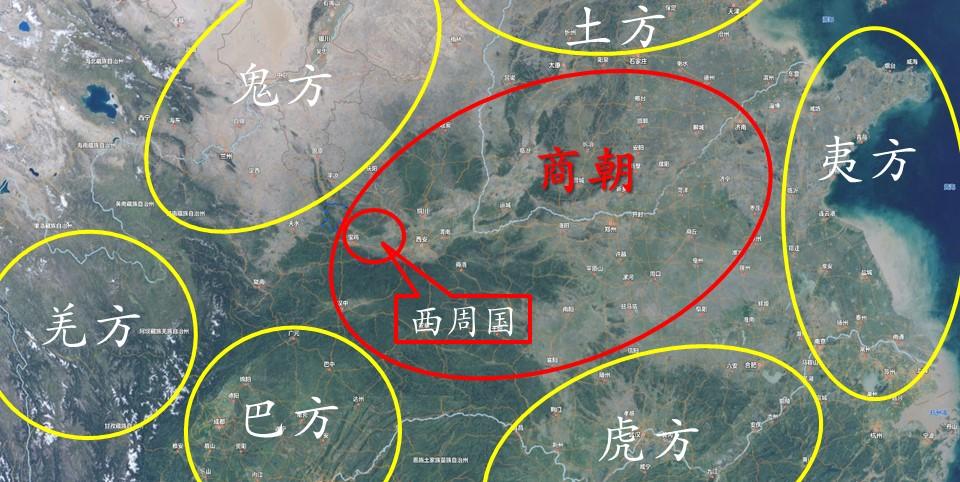
The last issue talked about ancient Chinese civilization, in the era of the Shang Dynasty in 1221 BC, for the first time encountered the invasion of foreign civilizations strong enemies "Ghost Fang". Led by a female general, the army resisted the attack of the "ghost side" and ensured the peace of the northwest border of the Shang Dynasty for more than two hundred years.
Since the five-thousand-year history of ancient Chinese civilization, it has also encountered aggression from the powerful enemies of those foreign civilizations.
Of course, the invasion of the same root civilization does not count, because the two brothers fight, and it does not matter who is the parent. As long as the language and words are not lost. Because language and writing are the carriers of a country's civilization.
At that time, there was a prince named Ji Chang in the west of the Shang Dynasty, who established a small princely state at the foot of qishan Mountain, and later continued to expand its territory to the east and west, and established itself as Wang Jiandu Hojing (present-day southwest of Xi'an), calling himself King Wen of The Western Zhou Kingdom, in 1056 BC, King Wen of Zhou died, and his son Ji Fa succeeded to the throne as King Wu of Zhou.
Around 1046 BC, when the Shang Dynasty army marched east to conquer the princely states of Dongyi, King Wu of Zhou took the opportunity to take the opportunity to fight against the absurd tyrant King Shang, known in history as the Battle of Muye. Because the Shang Dynasty army could not return to the Eastern Expedition, the Yin Shang King was captured, the Shang King set himself on fire in Lutai, the Shang Dynasty was destroyed, and the Zhou Dynasty was established, with the original capital of Hojing (present-day southwest of Xi'an, Shaanxi). The destruction of the Shang Dynasty by the Small Fang State of the Western Zhou Dynasty was the invasion of the Tonggen civilization, because they were the same root culture and the same ancestor. It's just two brothers fighting, competing for the boss's seat.
In 1021 BC, the fourth king of the Zhou Dynasty, King Kang of the Zhou Dynasty, succeeded to the throne, and when the Zhou Dynasty army attacked the eastern princely states, the "Ghost Fang" tribe took the opportunity to invade the northwestern border of Western Zhou from the west of Qishan and Longxian County, threatening the safety of the Zhou capital Hojing. King Kang of Zhou decided to lead an army to the west to conquer the "Ghost Fang" people, and after two large-scale battles, the Zhou army killed more than 4,800 people in the Ghost Fang, captured more than 13,000 of its four leaders and soldiers, and captured many chariots and horses and a large number of cattle and sheep. Thus, the campaign ensured peace on the northwestern border of the Zhou Dynasty in ancient China for about 300 years.
In the rolling history, ancient Chinese civilization also experienced two foreign civilizations to change dynasties, one is that the Mongols in 1271 AD, the Song Dynasty destroyed the Yuan Dynasty, the powerful and fierce Mongolian nomadic tribes once hit Europe, the establishment of three khanates and a Yuan Dynasty.
Second, the Manchu Qing people established the Qing Dynasty in 1636 AD, destroying the Ming Dynasty. Even after experiencing two invasions of foreign civilizations, destroying families and changing dynasties, ancient Chinese civilization and its culture have never been interrupted. And why?
If you think about it, the reason why the other three ancient civilizations were destroyed was because not only were their countries destroyed, but even their writing and language were forbidden to be used by the rulers, and in the end, their civilization naturally disappeared.
Therefore, the rulers of a country can change dynasties, but the words and languages that represent the civilization of their country cannot be exterminated.
During the two ruling dynasties of the Yuan Dynasty and the Qing Dynasty, although the ancient Chinese civilization used the ruler's language as the official language, it never prohibited the use of Chinese for communication. When the official promulgation of rules, regulations, and circulars, they are also translated in Chinese to announce them. In the field of circulation, its Chinese characters were retained on coins, and later only Chinese characters were on its coins. When selecting talents in the official imperial examination, it is also necessary to use Chinese to take the test.
Especially in the middle and late Qing Dynasty, its official language has been completely changed from Manchu to Chinese, and in 1716 AD, it lasted for six years and was carefully crafted. Revised and published the Kangxi Dictionary in Chinese. Standardize the meaning of glyphs so that officials throughout the country can learn Chinese uniformly. It indicates that the Qing Dynasty had established Chinese as the official language. In 1792, the fifty-seventh year of Qianlong, it took another thirteen years to compile and publish the "Four Libraries Complete Book" in Chinese.
It can be seen from this that after the invasion of foreign civilizations, they not only did not destroy Chinese civilization, but were assimilated by the charm of Chinese civilization.
Therefore, Chinese civilization has achieved continuous and unique ancient Chinese civilization for thousands of years, with its excellent cultural heritage, highly intelligent civilization and unique national charm.
Later, everyone recognized that those who offended china would be assimilated by Chinese civilization!